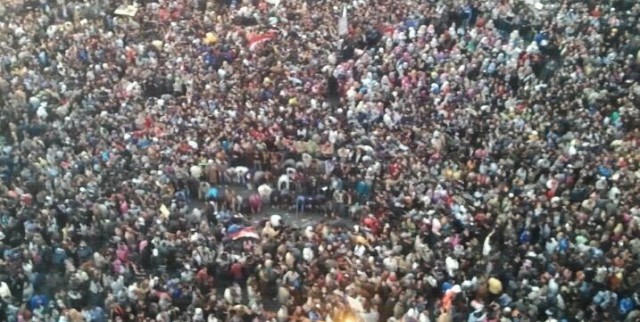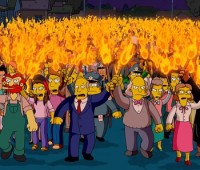What's Wrong with the HBO Movie?

This is totally a thing! Richard Rushfield went to see a forthcoming HBO movie and came away thinking… hey, that is sure an HBO movie! It’s “an intriguing concept, great art design, some fine actors that somehow doesn’t come together as anything special or present any compelling reason why it should be up on a big screen.” Hey, yeah, that! First, there’s a certain kind of sweeping literalism to the high-end TV movie and miniseries: what’s Temple Grandin about? Oh, Temple Grandin. What’s Too Big to Fail about? What’s Hemingway and Gellhorn about? Ohhhh. I think part of this is: HBO straddles the budgetary line between movie-movies and TV. They make the million- or couple-million-dollar, high-end movie. It’s a great awards and prestige strategy; they can dominate in the space, but still not spend a lot. And they can take films that otherwise have no distribution future — films that should be seen, for sure! — and mold them to the form.
Bob Balaban (recently directing “Nurse Jackie” episodes) has become a specialist in this: when he made Bernard and Doris, which was distributed by HBO, he told me: “Truthfully if we had a dollar more it would have been easier but we didn’t need $20 million to make this movie…. If we had more money, we would have been obligated to have parties and jet planes.” So this actually gets financed in an unusual way: the cast does it for the awards and the fun, shoots are quick and, according to Bernard and Doris producer Dana Brunetti (the president of Kevin Spacey’s production company) sometimes everyone owns a piece of the film. (“Kind of like working at Starbucks,” Brunetti told me.)
So like, with HBO’s future slate, James Gandolfini is executive producer of Hemingway and Gellhorn, along with a cast of others: HBO is happy to take on these relatively low-cost productions, with all these names, and they get a product that’s perfect for the market… and yet sometimes it can feel like a school play. (Mildred Pierce was the ultimate example of this. So many brilliant components, garnering lots of awards, sometimes adding up to less than something.)
HBO manages series shows, in general, better than movies (and manages documentaries, historically, best of all), and of course it’s wonderful that we have access to all this stuff at a really incredibly low subscription price. But there’s something of a formula rut to the HBO movie, which is frustrating. It all feels over-elaborated and yet a little under-thought. Playing to sweep the Emmys isn’t always a fun game for the rest of us.
Leonard Cohen, "Show Me The Place"
Show Me The Place by leonardcohen
I am as big a Leonard Cohen fan as they come, but I still couldn’t stop from mentally adding the words “On The Doll” when I first saw the title of his new song. Does that make me a bad person?
The Youth of the Egyptian Revolution
by Christian Vachon

A week ago one of my eleventh-grade students approached me after class. “It will be starting again,” he began. “This time the target will be against the military government. The first set of demonstrations will be this Friday, but they will continue until a second wave of the uprising will begin. This time it will demand the resignation of the SCAF” — the Supreme Council of Armed Forces. “It will be bloody and you should not go to the demonstrations. Maybe once all of the people come out, then you can come. For now there is widespread fear of Israeli spies and you will not be safe in these places for the next few weeks.”
Prophecies of impending social implosion and plots for fundamentalist conspiracies are a favorite topic for small talk in Cairo. I responded indifferently.
“Wait,” he said, before he walked away.
Then, on Sunday, the second day of this uprising, two other students came to see me after class. “The protesters were almost defeated,” they told me. “The Ultras White Knights saved the revolution.”
The Ultras Ahlawy (UA) and Ultras White Knights (UWK) are teenage boosters for Cairo’s two professional soccer clubs, Al-Ahly and Zamalek. Both fought on the front lines of the January revolution.
The student continued: “At eight last night, the CSF had run the protesters out of Tahrir Square. Security forces had occupied the roundabout. The Ultras White Knights charged from the museum, yelling the chant about how they’ll fuck the CSF up.”
I first saw the Ultras White Knights last April, in Tahrir Square, during a Friday demonstration against the SCAF. Five thousand kids holding a twenty-foot Egyptian flag came marching from a side street into the Square. At the head of the group was a kid of 15 with a drum leading a chant directed towards the police: “That’s right motherfuckers, we haven’t forgotten Tahrir, motherfuckers. And we’ll fuck you up again, motherfuckers.”
In August they led similar chants, this time against Field Marshal Tantawi, the head of the SCAF. When the match was through, CSF officers attacked Ultras Ahlawy outside the stadium. One of the Ultras was killed, run over by a security truck.
And at a Zamalek soccer match last month, hundreds of CSF were lined in sections reserved for the White Knights. “Be sure to sit beneath the stands,” a friend advised as were choosing seats. “The last match, the White Knights were throwing bags of urine at the CSF.”
Yesterday morning, I sat in my classroom at 11:30 a.m. with my 5th period English class. Beside me was the student who first told me this uprising would return to Egypt. There were bags beneath his eyes. He’d spent the night fighting in Tahrir. “I have to go back,” he told me and gathered his books together. As he stood up there was a clap, and then another. An ovation rose as he walked over to the classroom door, opened it and looked back at us.
“We have to support him,” someone said. “We may never see him again.”
* * *
This morning the street outside my apartment was empty when I stepped out. All the children I normally see playing in the street had disappeared and there was silence and the hazy sunlight of the early Egyptian winter. I hailed a taxi downtown.
“Is this another revolution?” I asked the driver, a young man in his early twenties.
He looked into the rear-view mirror and nodded. “The job of the military is to fight. It is not to rule,” he began. “The people fighting down there have no money. We are all poor. I too would be fighting if I did not work. I have a baby girl. She is sick. I cannot afford to send her to the doctor. I will drive until I have enough money to take her to doctor. Then I will go and fight.”
I met some journalists at a cafe down the street from Tahrir, away from the crowds gathered around the corner. In the past twelve hours, the narrative of this uprising has taken on a familiar pattern we all recall from the last revolution. As of this morning, as far as we know, 33 Egyptians have been confirmed dead and thousands have been injured. Last night the country watched images of bodies being carried from the front line fighting on the side streets, into one of the makeshift hospitals around Tahrir Square. In the face of this crackdown, foreigners have been targeted. This morning three students at the American University of Cairo were arrested. Another American has been arrested and deported, accused of throwing a Molotov cocktail at the Ministry of the Interior. In response the U.S. has sent out an alert, reminding all Americans that if we are arrested by Egyptian authorities, we are subject to their laws. In short, you’re on your own.
And this is why we met in an 1930s-era cafe, hidden in a side street down from the square; with stained wood paneled walls and framed black and white photos of tuxedo-clad Egyptian film stars from the 1950s. “Is the world aware of this yet?” I asked a European correspondent. “Well aware,” he said. “The news celebrities have all booked their flights. Soon they will be here with their pretty haircuts, pressed suits, their helmets and their flak jackets, pretending to be experts.”
Ten feet past the Tahrir entrance checkpoint, the Square was a maze of thousands of Egyptians. Some looked as if they had not slept in a week; their faces drawn and dusty, surgical masks hanging off the side of their faces. And ten feet inside the Square, two Egyptian men in suits and sunglasses stopped us. “You should not be here,” one said. “The square is infiltrated with secret police. They are arresting foreigners at random and the Egyptians are very nervous about foreign spies.” We wrapped our faces with scarves, put on sunglasses and walked out to the center of Tahrir. A few hundred protesters began to sprint towards the Nile. It is in these moments that built-up fear and tension, the natural state of the Square, take form. Something, anything — a loud crack, or an emerging car at the end of the Square — sends 15 protesters fleeing. Soon five hundred have joined the sprint, but no one is quite sure why. While the panicked run back, a brave few sprint forward to fight off the encroaching threat. Seeing it is a false alarm, they signal to the rest.
“You must get out now,” a friend calls to tell me. There are rumors that authorities may ignite a natural gas pipeline near by. We walked out, through the other end of Tahrir Square, across the Nile. As we walked there were blasts of tear gas coming from Tahrir. The blasts ring in series of twos and threes. A minute later I got a text message from a student: “Tear gassed,” the text said. “Lots of coughing. Hard to breathe. Don’t worry. We’ll be fine. Freedom is priceless.”
Editorial note: This article was edited to clarify which events involved the Ultras White Knights (and not the Ultras Ahlawy).
Christian Vachon lives in Cairo. He posts regularly to Twitter.
Thanksgiving Will Kill You
You’re not just going to be bored to death this holiday season: “[The] post-meal recovery period is being studied by scientists who are increasingly finding that what happens in the body after eating a big meal doesn’t just bring on sleepiness, commonly known as food coma. It can also increase the risk of later health problems.”
The Woodcutter on the Dole

“Woodcutter,” she said, “be of good cheer! I am your Gift Fairy, and I will give you and your family enough to live on. You will have food, and can buy shoes for your son and daughter!”
“Gracious lady,” said the woodcutter, “you are very kind. What can I do to deserve such a gift?”
“To deserve my gift, woodcutter, you must not work, but every day you must look for work,” said the lady. “You must try four times a day to find a job. No matter if there is no work to be found, you must not stop looking for it. I will be watching you. I will know if you grow discouraged. If you cease to look for work for one month, I will know it, and my gift will cease to appear.”
Disposable Teens

The comments on this Dealbook piece about how Wall Street has reconstituted the notion of employment as bottom-line cyclical churn are 100% mean, as you’d expect. (“I can’t help but wonder if any of these laid-off wunderkinds ever ask themselves whether they contributed to the current economic situation,” for example. And: “My God these people are pathetic. Even when they’re laid off and collecting unemployment, they still sound like insufferable snobs.”) But the sheer numbers involved in the way financial firms chew up and spit out young people are pretty bad. These are the very kids who were the children of the subjects of New York magazine parenting articles: we cared about them when we worried they were probably autistic, and then when their young parents were striving to get them into the best preschools, and then again when the kids spent the next sixteen years trying to beat each other on the SATs and the GPAs and the extracurriculars, so why shouldn’t we care about them now that they’ve entered a workforce where they regularly get kicked to the curb because some dickface in management has to sack a quota of analysts to make his now-regular layoff goal? When you’re laid off twice by 28, that’s rough! And that’s tens and tens of thousands of young people who were sold a dream and an expectation about merit, performance and success, and now they’re figuring out one by one that it was literally all a lie. Probably half these kids will turn out bitter and evil and scheming, but, if we’re lucky, half the kids will figure out that the prevailing corporate system of doing business is utterly screwed. Maybe a few will even do something about it.
One Day Soon, Ferns Will Rule the World

As we head into the late days of November, at least here in the region around New York City, most of the ferns have turned sallow and dry, so that it’s difficult to believe that only a few months ago, they formed a lush, dense carpet of shadowy green on forest floors everywhere. While it’s tempting to be taken in by these superficial signs of frailty and expiration, do not be deceived: those of us who spend time with ferns understand that they are plotting, and one day soon will again rule the world.

For those of you not acquainted with ferns, or think of them mostly as adornments to Belle Epoque interiors or art nouveau borders, it’s worth remembering a few facts: 1) Ferns have been on the earth for 360 millions years, which is at least 100 times longer than Microsoft, Google, and Apple combined, and 2) ferns reproduce with SPORES.

If ferns are so powerful, why did they relinquish their reign on the planet? The answer is simple: they were exhausted after killing off the dinosaurs. If you don’t believe me, there are fossilized images of ferns chomping down Tyrannosaurus Rexes like amuse-bouches. The government has kept these images secret for obvious reasons and, moreover, has invented distracting stories about UFOs, but rest assured, my friends, it’s not the aliens we should be afraid of. The ferns have merely been resting, but will soon enough wake up en masse to begin a march of unprecedented propagation and destruction that will leave every remnant of human civilization buried under a seething jungle of roots and fronds.

Ferns have already infiltrated high sectors of government and industry, which should be apparent to anyone who has studied global warming. Do you seriously think ferns are bothered by climate change? To the contrary, they have engineered it. As we die off, they will just grow bigger and stronger; if the seas rise, ferns will colonize the ocean floor just as happily as they will the cities and the suburbs. Even the cockroaches are afraid of ferns.

The next time you go for a walk in the woods — or really anywhere that’s not completely embedded in at least ten feet of pristine concrete — listen carefully, because underneath the rustling of the dead leaves, and beyond what you may imagine is the wind or the distant howling of wolves, you will hear what is actually the laughter of ferns as they unroll their sporey fronds and prepare to eat your soul.

Matthew Gallaway is the author of The Metropolis Case and the director of Remembrance of Things Past.
Silvio Berlusconi Will Live To Bunga Again
“Berlusconi’s political agenda is very clear: he has been reported as saying that his party will ‘unplug Monti’s government life support whenever necessary’. And this is likely to happen as soon as his name rises in the polls again. There couldn’t be a clearer indication of Berlusconi’s plans: in the expectation that Italians will quickly forget the incompetence he displayed while in power, Berlusconi hopes to lead his party to success at the next general election in 2013. Those who had hoped that Berlusconi would finally withdraw from politics to write his biography will be sorely disappointed.”
